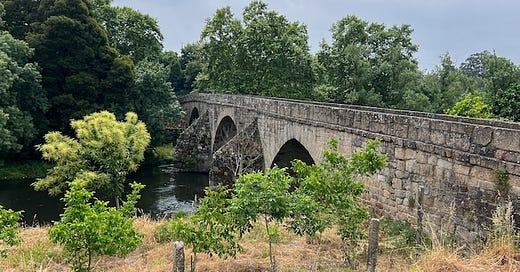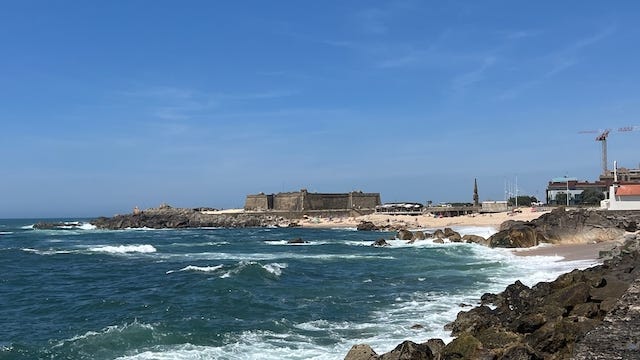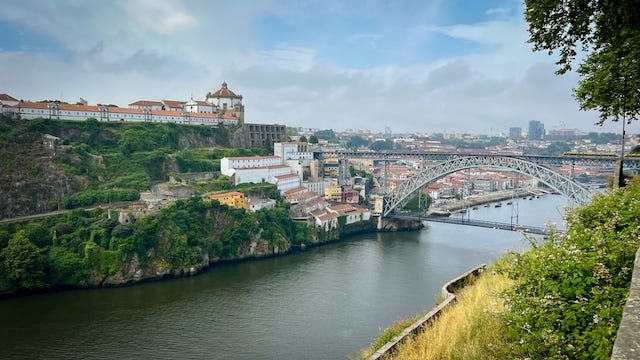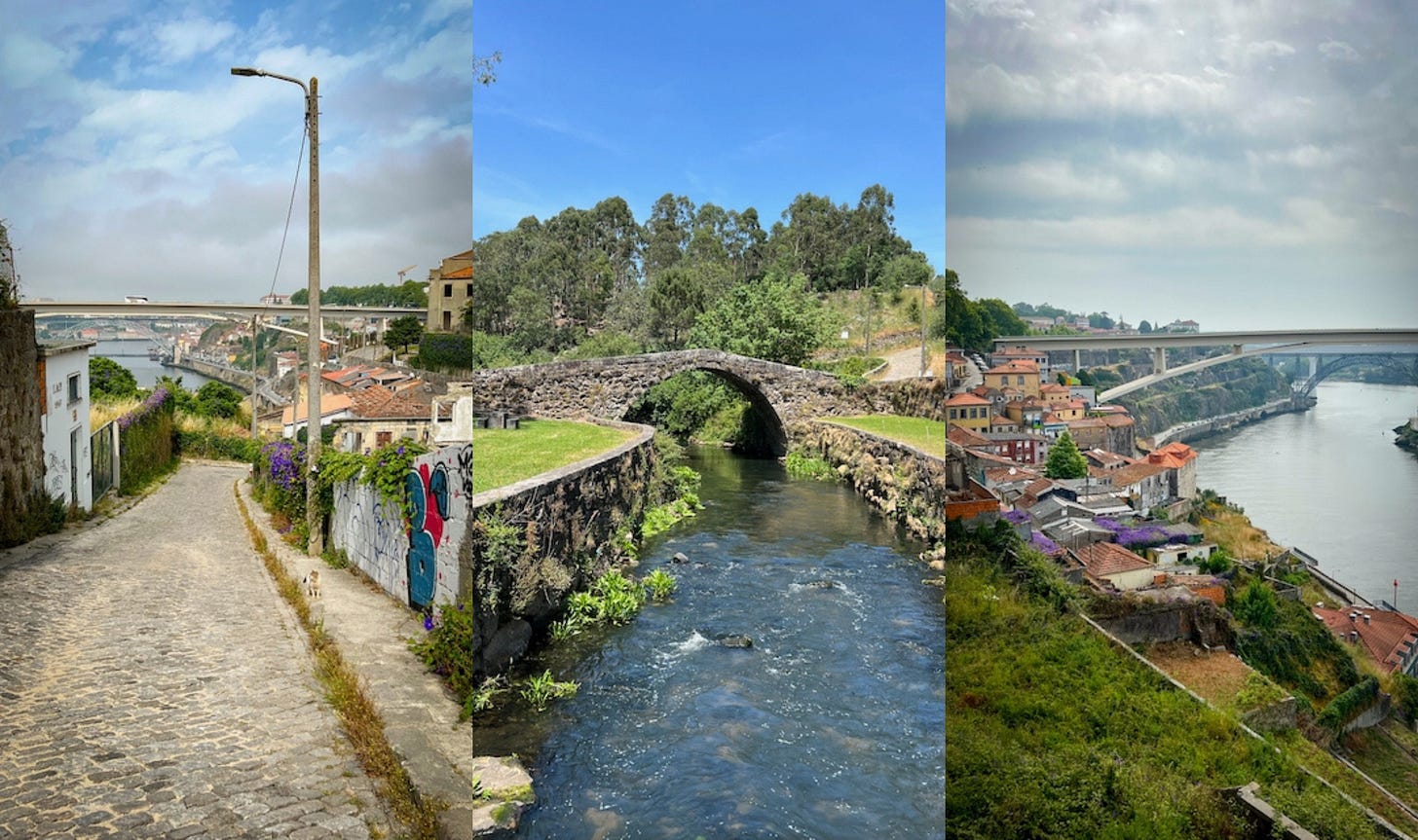Hello everyone!
I’ve had more and more Americans reaching out to me with questions about how we flipped the table on life and moved abroad… specifically, the financial side of it.
So this week, I’m diving into:
Expat Economics
The Joy of Double Taxation
Quick Hits
Here we go!
Expat Economics
Social media is full of expat influencers bragging about carefree lifestyles. It’s an enticing dream - move to a country like Portugal, where the houses and wine cost less, the vibe is laid back, and every day is spent wandering through charming medieval alleys.
I’m not saying there isn’t some truth there... It’s just half the story. So I’ll share some of the little financial surprises that we encountered along our path.
Getting Residency
To apply for Portuguese residency via the D7/D8 (retired/digital nomad) scheme, you need to acquire a decent amount of paperwork, all of which costs money. This includes fingerprinting for an FBI background check, apostilled documents, and a year+ rental lease (or property deed) in Portugal.
To get a lease, the only sane route is to fly to Portugal and sign one in person. This means paying for airfare, lodging, and meals while scouting, plus a down payment and rent. It’s rare to get an advance lease, so you’ll start paying right away.
Once you have your lease (and all that other documentation), you fly back to the States to apply for your visa. This involves travel to your regional VFS office and more fees, with all the associated airfare and lodging costs.
The application process takes anywhere from 2-6 months, so you’re paying for a lease in Portugal this whole time while you wrap up your affairs in the States (without knowing if your visa will be approved).
Once approved, you have a short window to get back to Portugal on your shiny new visa… which gives you 120 days to wait for your appointment with AIMA (immigration agency) to turn your visa into a 2-year residence permit. This appointment will likely involve in-country travel, maybe lodging, and relatively small fees.
Yay, now you’re a resident! It only cost thousands and thousands of dollars/euros.
Rebuilding Your Life
We seriously lucked out when we landed here and found an apartment that was fully furnished… down to the linens. That’s unheard of. Usually it’s furniture, maybe kitchen stuff.
So you have a choice - rent a container and ship your whole life across the ocean (which means spending thousands of $$ and waiting a couple of months for your stuff) or sell it all and buy it all again when you get here. A third option is to bring just some of it with you, but bag fees add up, and at some point, it gets expensive to fly those pots and pans over.
It’s hard to calculate what this will amount to, just assume it will be a lot, so you don’t have any unwelcome surprises.
Pro tip: If you have guests visiting soon after you arrive, you can always leave extra packed bags with them to bring over for you.
Daily Life
If you move to a place like Portugal, most of your daily life expenses will be far less than in the States. Groceries, restaurant tabs, coffee, wine, beer, healthcare, public transit… they’re all way cheaper. And that makes a huge difference in our everyday enjoyment index.
We don’t cringe every time we ask for the check after a meal (and no tipping!). Stopping at a cafe for a coffee or a fino of SuperBock costs mere pocket change. And we’re paying 200€/month for full private insurance vs. the $1,000+/month we paid in the US.
But not everything costs less!
Portugal tacks on 23% VAT (+ import duties) on most non-food consumables, so iPhones, watches, Nikes, computers, etc, all cost at least 23-33% more.
Gas is around $7.5/gallon, and car inspection/registration isn’t cheap. The main highways are toll roads, and a 3.5-hour drive to Lisbon can cost around 30€ one way, not including gas.
Electricity in Portugal is some of the most expensive in Europe. Far costlier than in America.
In short, daily staples like food, public transit, and café life are all cheap. But start living large, and you’ll pay for it. Fortunately for us, we are trying to shed some of our consumerist habits, and the higher prices are a great motivator.
All these extra taxes are paying for the things that make these countries so great, like actually taking care of the health and well-being of their citizens.
The Joy of Double Taxation
The US is one of only 3 countries in the world that taxes its citizens even if they move abroad. This is a mind-numbingly complicated topic, and I don’t want to bore you. Here are a few headache-inducing tidbits:
I have to file taxes in both the US (April) and Portugal (June) every year. This means paying two CPAs and filing twice.
The US and Portugal have a tax treaty that says I don’t get double-taxed. Technically, my taxes paid in Portugal offset what I should owe in the US, or vice versa, but it’s vastly complicated how this works. Hence, the two CPAs.
Yes, the Portuguese IRS and the US IRS talk to each other.
My taxes have to match. No hiding things from one country and not the other.
Portugal has a special tax incentive called the NHR that reduces my tax rates here.
The NHR allows me to do some tricky things with my LLC to limit my Portuguese tax burden (which can climb up above 50% for people who make what would be an average wage in the US).
Despite paying a lower effective rate under the NHR (much to the chagrin of regular Portuguese), foreigners pay millions more than they get back from the system. Primarily because we bring much higher wages with us. It’s a net positive.
For all these reasons, spring is a really expensive season for me.
If you’re interested in living abroad, you should seek expert financial advice. There are many clever ways to avoid the headache of double taxation, some of which involve different types of residency visas (that don’t require you to have a tax residency here). It’s also possible to structure global LLCs to lower business taxes.
But that’s for someone else’s substack.
*None of this is legal advice. Consult an expert.
What does this all add up to?
If you’re lost in the clouds dreaming of the simple life in Southern Europe, do your homework to see just how much it will cost for you to get here. And be real about what things you’re ready to do without (or pay more for), like those yearly iPhone upgrades.
For us, the payouts of this life choice have been priceless. And we don’t really miss the stuff we have a harder time affording over here.
We just miss our people.
Quick Hits
Hilary’s foster kittens are growing, and as of yesterday, all four have found furever homes. The mama cat and Flor (the gray tabby) went together, and Sol and Carmo each got adopted separately. Hilary truly is an amazing foster mom.
June is the patron saint month, with parties honoring the santos populares (Antonio, João, and Pedro) taking place all over the country. Porto’s São João party happens later this month, but the city is already buzzing with the preparations. Portugal Decoded, one of my favorite substacks, has a good primer on the whole deal.
Our temporary residency permits are still expired, and the government decree automatically extending their validity expires on June 30th. We do not yet have renewal appointments, and no way to force the issue. So we are mere weeks away from becoming illegal immigrants. The consensus expectation is that the government will issue a new decree extending the validity for at least another year so AIMA can catch up on the backlog. Please keep your fingers crossed for us.
What have you been up to?
This week’s music is the new album from Little Simz, Lotus. It’s a great new effort from a favorite UK Grime hip hop artist. Enjoy:












Excellent under-the-hood look at all of this! Thank you. So easy to have rose-colored glasses on before jumping into living abroad (or any big move??) I'm doing that for suuuure as we consider where and how we want to live in Europe.
I'd love to read a "if we did it again" post about lessons learned from moving abroad!
Cheap public transport and beer is the two things our visitors to Europe notice first. Great coffe and inexpensive bakeries, oh my! Gas and electricity might be expensive but then the abodes are small and the distances short. Greetings from Prague!